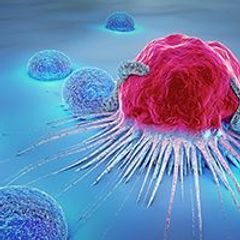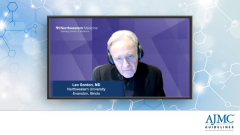
Utilizing Bispecific Treatment in Relapsed DLBCL Patients
Dr Gordon discusses use of bispecifics for management of patients with relapsing DLBCL.
Episodes in this series

Leo Gordon, MD: In relapsed disease, I think most patients who relapse, or they relapse say 3 or 4 years later, we’re still talking about an autologous stem cell transplant. So, 2 cycles of chemotherapy, stem cell collection, repeat CT or PET scan. If it looks like people are in remission or near remission, we would probably go ahead and do high-dose chemotherapy, followed by infusion of the patient’s previously collected stem cells. In our institution that usually involves a 2- to 3-week stay in the hospital. In our institution, on average the blood counts recover somewhere between day 10 and day 12 after treatment. So that’s a standard approach in patients with DLBCL [diffuse large B-cell lymphoma] who are young, fit, [and] have relapsed 2 or 3 years later. We don’t have an age cutoff that our institution. I think the morbidity and mortality starts to go up over about 70, 75 years of age. So when I started seeing patients in that age group, even if they relapsed after 2 or 3 or 4 years, I would favor using CAR T [chimeric antigen receptor T-cell] therapy. The only one approved for that right now is liso-cel [lisocabtagene maraleucel]. It’s based on the PILOT study I alluded to earlier. That’s been my approach in that group of patients. We just published a quality of life study on that approach in that group of patients. And it’s clear that people tolerate this fairly well. There is the risk, as I mentioned, of the cytokine release syndrome and the neurologic toxicity, but that isn’t very common and certainly manageable.
For patients who relapse within a year based on the data from TRANSFORM and the ZUMA-7 studies, I would say CAR T with either axi-cel [axicabtagene ciloleucel] or liso-cel, or also a licensed cell, should be the standard of care. That’s at least in my view. If patients recur now we see maybe 80% respond, 60% complete response, but only 40% of patients are cured or have long-term remission after CAR T. So, we do have to worry about what to do after that. There weren’t a lot of options. We try and go to allogeneic stem cell transplant if we can. But those patients can be pretty sick if they relapse after CAR T therapy. There may not be time, or they may not be well enough to go on to allogeneic stem cell transplant. That’s still proven to be the best outcome if you can get patients there. But now we have the bispecifics. I would say someone that progresses after CAR T therapy, epcoritamab or glofitamab would be options. Just since the approval, we’ve treated 3 or 4 or 5 people with the bispecific [approach], and that is fairly clear in the guidelines that those are the main options for relapsed disease.
In patients who are not candidates for either CAR T therapy, autologous or allogeneic transplant, or even in the bispecific, then we have other options. We’ve used Revlimid and Rituxan. There’s a combination of Revlimid plus a drug called tafasitamab, which is like Rituxan but [is] for CD-19 instead of CD-20. There is loncastuximab, that I mentioned. Selinexor, which the data doesn’t look that promising to me…it’s approved based on about a single-digit overall response rate, but it is out there.
I have never used a PI3K inhibitor in DLBCL. I’ve used it once in follicular lymphoma. The toxicity is pretty significant, I think. And so, I don’t think it has a place in DLBCL. BTK [Bruton tyrosine kinase] inhibitors might have a place. Their data doesn’t look great, but they are out there. And that is certainly a possibility as another palliative-type treatment. And then there is the discussion that we have in lymphoma, not as much as in other diseases, but it’s probably [that] they’re of supportive care only in hospice and palliative care, or best-supportive treatment is always an option for people who don’t necessarily want to go through some of these treatments that we’re talking about.
Transcript is AI-generated and edited for clarity and readability.
Newsletter
Stay ahead of policy, cost, and value—subscribe to AJMC for expert insights at the intersection of clinical care and health economics.











